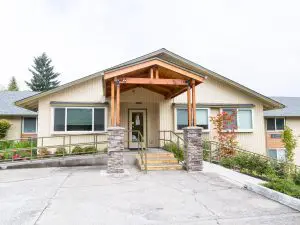Percocet Addiction Treatment in Washington & Oregon
Written by Renee Deveney
& Medically Reviewed by Dr. Sarah Dash, PHD
Medically Reviewed
Up to Date
Last Updated - 6/17/2022
View our editorial policy
Percocet is a brand name drug that contains both oxycodone and acetaminophen, used to treat moderate to severe pain. Percocet has a high risk for misuse and addiction even if used with a prescription. Percocet abuse has many short- and long-term side effects, and the consequences can be severe and even deadly.
When someone is addicted to Percocet, the body begins to rely on it to function normally. The process of recovery includes tapering off Percocet as well as therapy to learn new skills and strategies for sober living. Treatment for Percocet addiction can be a challenging process, but there are many options available to support those looking to begin their recovery journey.
Percocet Treatment Options
The best way to stop using Percocet depends on the severity of the addiction, whether Percocet has been combined with any other drugs or alcohol, and the overall health of the person seeking treatment. There is a range of Percocet addiction treatment options that can be tailored to meet your medical needs and to make you feel safe and comfortable.
Medical Detox
Medical detox is an important first step in the recovery process that involves the process of Percocet completely leaving your system. Medical detox takes place in a hospital or supervised drug rehab facility, and may be medically necessary as part of Percocet overdose treatment. Medically supervised detox is the safest option for those with chronic substance use disorder or those who have shown symptoms of overdose.
Residential Rehab Programs
Some Percocet rehab programs offer live-in treatment and structured therapy, where patients live, sleep and eat at the center where they are receiving treatment for addiction. These residential treatment rehab centers can offer medical supervision and intensive therapy in an environment that is separate from some of the stressors or habits related to a person’s drug use.
Outpatient Rehab
In some cases, it might be suitable for people living with an addiction to Percocet to receive treatment while still living at home. This might be suitable for people taking a lower dose of Percocet, people without a co-occurring mental health condition, or after the completion of a residential rehab program. Outpatient rehab still includes regular contact with a doctor, supervised tapering off of Percocet and attending individual or group therapy.
Dual Diagnosis
Dual diagnosis includes a diagnosis of a mental health condition alongside a Percocet addiction, and this can require more complex treatment. In cases of dual diagnosis, it’s important that both conditions are fully addressed through treatment. It is recommended that detox from Percocet is completed before beginning treatment for the mental health condition. Treatment for dual diagnosis can happen in an inpatient or outpatient setting.
Aftercare & Sober Living
Rehab is an ongoing process and extends beyond the completion of an initial or outpatient rehab program. There are many options that can help a person transition from addiction treatment back to their home environment and life. Aftercare includes activities like continued therapy, attending group meetings, or finding peer support from people with similar experiences. Some people might choose to spend time in a sober living facility as part of their transition to support building their skills and strategies for sobriety when they return home.
In 2017, there were over 700 overdose deaths that involved opioids in Washington State. Prescription medications are a primary cause of overdose deaths in Washington State, and seeking treatment for Percocet addiction can be lifesaving.
How Long Does Percocet Rehab Last?
There is no set timeline for addiction rehab, and the timeline of formal rehab can vary from multiple weeks to years. How long rehab takes depends on the addiction severity, combination with other drugs and alcohol, and whether there is a dual diagnosis of a mental health condition.
Recovery is an ongoing process and continues well after a formal treatment program is completed. Rehab will usually include multiple steps, such as detox, structured therapy and aftercare programs. Rehab is designed not only to stop the body’s physical dependence on Percocet, but to build skills and strategies for sober living. The length of time that this takes to support recovery varies from person to person.
How Much Does Percocet Rehab Cost?
Concerns about how much rehab costs can sometimes keep people from seeking the treatment they need. Rehab costs depend greatly on the type of treatment, but there are treatment programs and incentives that can help people in all situations get the treatment they require.
In general, residential care is the most expensive treatment as it includes the cost of living, food as well as medical and therapy-related costs. These costs can range from hundreds to tens of thousands of dollars, depending on the length and luxury of the program. Insurance often covers at least some of the costs of inpatient care. Outpatient treatment can be more affordable for many people and includes visiting a clinic or treatment center for regular therapy, appointments or group meetings.
The cost of rehab depends on insurance coverage, as well as the types of services and programs that are subsidized or provided for free by states and communities.
Does Insurance Cover Rehab for Percocet Addiction?
In the U.S., insurance plans are now required to provide coverage for mental health conditions like addiction. These mental health conditions are treated like physical health conditions. There are many types of treatment that are commonly covered by insurance. Insurance can significantly reduce financial stress around attending rehab or getting treatment, but coverage can vary depending on your plan.
Whether insurance covers a specific rehab program depends on your coverage, and should be discussed both with your insurer and the treatment facility. In order to address addiction in the community, some treatment programs are supported by state or local governments. These are considered options for attending rehab without insurance to ensure you get the care that you need.
- Government-Assistance Programs: These programs are partly or completely paid for by the government to help people in the community get the medical attention and treatment that they need. A list of government-assisted rehab services around the country can be found through the Substance Abuse and Mental Health Services Administration (SAMHSA).
- Sliding Fee Programs: Costs of sliding fee programs are adjusted according to a person’s financial situation or ability to pay for treatment. For example, sliding fee programs offer lower-cost treatment for those who might not be able to afford treatment otherwise.
- Private Pay Programs: Private pay programs are often the most costly and are normally paid upfront and in full before attending treatment. These programs are often chosen by people willing or able to cover treatment costs, or by those who might not be covered by private insurance.
Choosing a Percocet Rehab Center in Washington or Oregon
There are many things to consider when choosing a rehab facility that is right for you. Different programs can offer varying levels of supervision, structure and types of therapy, and it’s important to consider what can best meet your needs for recovery. Health professionals and specific rehab facilities can offer advice based on your situation as to what treatment might be the most appropriate for you.

The Recovery Village Ridgefield
888 Hillhurst Rd. Ridgefield, WA 98642
(855) 703-1445
For those who are local to the Portland, Oregon, or Washington State area, there are many drug rehab options that offer a range of services to support recovery from Percocet addiction. The Recovery Village Ridgefield offers a range of inpatient and outpatient treatments that are close to home. If you or someone you love is living with Percocet addiction, contact The Recovery Village Ridgefield today to discuss treatment options.
Sources
Food and Drug Administration. “Percocet.” Endo Pharmaceuticals, November 2006. Accessed August 8, 2019.
National Institute of Drug Abuse. “Treatment Approaches for Drug Addiction.” January 2019. Accessed August 9, 2019.
Buck, Jeffrey A. “The Looming Expansion And Transformation Of Public Substance Abuse Treatment Under The Affordable Care Act.” Health Affairs, 2011. Accessed August 9, 2019.
McCaffrey, Barry R. “Treatment Protocol Effectiveness Study.”Office of National Drug Control Policy. March 1996, Accessed August 9, 2019.
Health of Washington State Report. “Drug Abuse and Overdose.” April 2014. Accessed August 10, 2019.
National Institute of Drug Abuse. “Washington Opioid Summary.” March 2019. Accessed August 10, 2019.
View Sources
Food and Drug Administration. “Percocet.” Endo Pharmaceuticals, November 2006. Accessed August 8, 2019.
National Institute of Drug Abuse. “Treatment Approaches for Drug Addiction.” January 2019. Accessed August 9, 2019.
Buck, Jeffrey A. “The Looming Expansion And Transformation Of Public Substance Abuse Treatment Under The Affordable Care Act.” Health Affairs, 2011. Accessed August 9, 2019.
McCaffrey, Barry R. “Treatment Protocol Effectiveness Study.”Office of National Drug Control Policy. March 1996, Accessed August 9, 2019.
Health of Washington State Report. “Drug Abuse and Overdose.” April 2014. Accessed August 10, 2019.
National Institute of Drug Abuse. “Washington Opioid Summary.” March 2019. Accessed August 10, 2019.
Authorship






